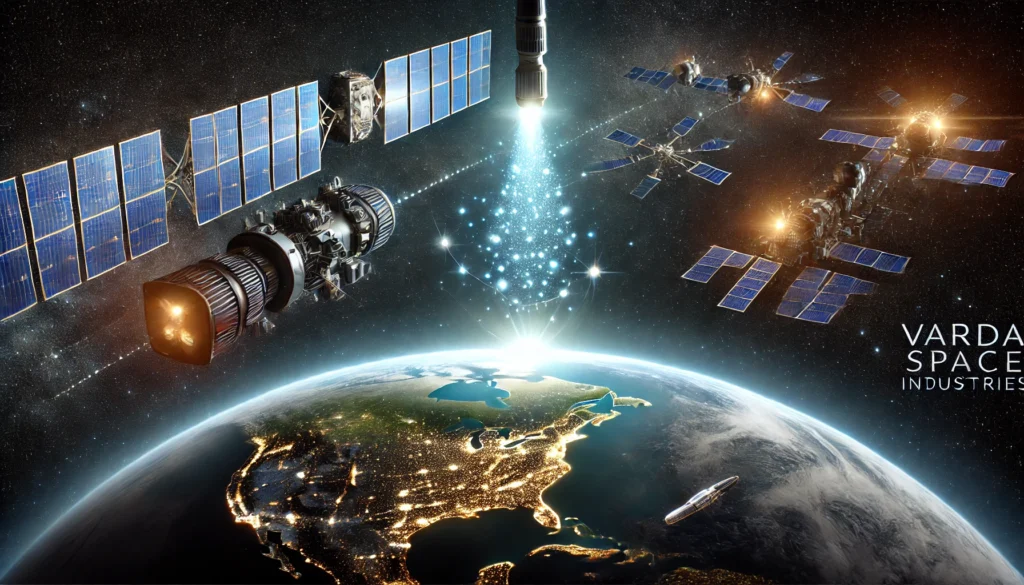In the ever-expanding domain of space startups, Varda Space Industries stands out with a bold vision: analyzed to give birth to the stepping stone we need to take manufacturing off the earth and into space. This young startup was established in 2020 by Delian Asparouhov and Will Bruey, and its goals are to bring the creation of the often expensive or simply unattainable here on Earth material and substance into space and use the opportunities provided by microgravity there.
The Vision Behind Varda Space
The idea of space manufacturing is not unique but to some extent, none of the current avant-garde of space industries seems to be as enthusiastic and clear-headed as Varda. Their objective is well defined—to build a scalable space factory system that would churn out high-quality products and then return them to earth. The opportunity to operate in microgravity means that Varda can create and offer products like fiber optics, pharmaceuticals, and semiconductors with the best quality and performance possible.
The gains that come along with manufacturing have the potential to be huge. This means that in the absence of gravity, materials can develop with the same inherent deficiencies not detected on the Earth’s surface. For instance, it appears that zero-gravity fiber optic cables are capable of higher characteristics than such cables made on Earth, and new drugs can be discovered through the use of space-grown crystals. In addition, new supply chains were created beyond the Earth’s orbit from space, which is the self-proclaimed aim of Varda Space Industries, a company that intends to redesign industries.
About the Founders
Delian Asparouhov, who currently serves as a principal at Founders Fund, is well regarded for both his enthusiasm for the technologies of the distant future and his capacity to choose between the crucial and the significant among emerging ventures. It was at Founders Fund that he first came up with the concept of Varda Space Industries; his goal was to consolidate commercial space ventures and industrialization.
Will Bruey, the co-founder and CEO of Varda is a veteran of SpaceX, where he was part of the development of the Dragon spacecraft which features in several space expeditions. Since day one of Varda, his technical background and leadership skills have been fundamental for the development of the idea, of a real functioning company.
A Universal Fact About Varda Space Industries
Working on Varda Space Industries, there is one interesting fact, and it consists in the fact that this project was named after the character of J.R.R. Tolkien’s legendarium, namely after Varda Elentári, the Queen of the Stars. This name symbolizes that the company wants to get to the top and build something unique. In addition, in environmental biophysics, Varda made a step forward by becoming one of the first companies to demonstrate that manufactured goods could be returned from orbit.
Turnover and Financial Status
Despite its relative infancy, Varda Space Industries has already begun gaining investment interest and attention overall in space tech. The exact turnover has not been released but analysts have estimated the company to be on course to make good revenues once this commercial production is ramped up. This allows a potentially very healthy revenue model, as they concentrate on high-margin, specialized products.
Investors and Funding
Since its establishment, Varda Space Industries has been dependable on premium investors only. In 2021, they successfully closed a $42 million series A funding round, which Khosla Ventures as the lead investor and other investors such as Lux Capital, General Catalyst, and Founders Fund among others. These huge funds have been instrumental in ensuring that Varda achieves its objectives of creating industrial solutions for space manufacturing on a large scale.
In the year 2023, the company Varda Space Industries received more funding to enhance its manufacturing front and also to widen the functional front of the company. As a result of consistent investor interest and increasing market demand, Varda Space Industries has the potential for long-term development.
Stock Market Status
For now, it has not been revealed whether Varda Space Industries is a startup or is owned by other parties since it is still a privately owned company. Despite several reports suggesting the potential of going public, there has been no clear indication that the company will go public shortly. Due to their fast growth and popularity among investors, the issue of an IPO may be relevant in the following years to continue the development and expansion of the activity.
Competitors
The company operates in a relatively obscure but experiencing exponential growth market; this is Varda Space Industries. Some of its notable competitors include:
Made In Space: Founded by Niki Kendrick, Made In Space concentrates on space manufacturing technologies and has tested 3D printers in the ISS. They have also embarked on programs for manufacturing ultra-high pure fiber optics in space.
Space Forge: A British venture whose goals are the usage of reusable satellites for on-orbit manufacturing and retrieval. They allocate their satellite design to constructing bio-efficient alloys and crystals within micro-gravity conditions for a sustainable world.
Redwire Space: Somewhat notably for a space infrastructure firm, Redwire brings substantial experience to the table for on-orbit manufacturing. They count on their real cooperation with NASA and other government institutions making them a strong competitor.
NanoRacks: Operates chiefly as a space-travel provider company and has designs for constructing orbiting space stations usable as manufacturing facilities. They have an advantage in scalable manufacturing, especially in the handling and putting of small payloads on the ISS.
Although these competitors such as Varda Space Industries differentiate themselves in areas such as scalable return missions and high-margined products they can improve on the space manufacturing business and push for competency.
The Business Model: A New Supply Chain Frontier
Varda Space Industries has a relatively simple business strategy, which indeed can be groundbreaking at the same time. The company develops affordable miniature launch vehicles that are also miniature manufacturing centers. Once such in orbit these micro factories manufacture the required materials which are then brought back to earth through a re-entry vehicle. Thus, based on the peculiarities of space circumstances, Varda Space Industries plans to target the most profitable segments with its products ensuring that the price added by the cost of extreme conditions is warranted due to the exceptionally high quality of the car parts.

While most traditional satellite companies were in communications, earth observation, or navigation, the primary function of Varda Space Industries is to deliver physically producible products. This places them in a niche area in the space environment because they are in a way a link between space and the real economy.
Furthermore, the goal of Varda’s model is in fact to invent an entirely new sector of space industry, orbital manufacturing for terrestrial use. This may create a space economy based on the construction and transportation of valuable high-adrenalized products to the space and vice versa.
Progress and Achievements
As will be seen later, Varda has come a long way since its formation. The company secured $42m in a Series A funding round in 2021 in a funding round led by Khosla Ventures with Lux Capital, General Catalyst, and Founders Fund. This has been instrumental in helping them to come up with their prototypes and to acquire the launch contracts.
In 2023, Varda successfully initiated its first demonstration mission to prove HOW it is confidently positioned to champion in-orbit manufacturing as well as the re-entry process. Fortunately, they were, and these outcomes revealed that their idea is not only feasible but can also be expanded. The mission proved integral systems, such as the re-entry capsule that helped deliver some materials back to Earth. This event portrayed the company as having a closed loop of manufacturing from space production, and delivery on the Earth’s surface.
Challenges and Future Outlook
Despite the possibility of seeing space-based manufacturing as a possibility, Varda has its challenges. Space access and utilization remain expensive; however, the cost of space launch is gradually reducing due to innovations by companies such as SpaceX. Furthermore, the ability to reach back down to earth with the manufactured products also needs an efficient engineering solution and safety guarantee.
Another limitation is regulatory constraints which have become a challenge. Astronaut business operations are constrained by many forms of inter-country laws and regiments, so Varda will have to liaise with government institutions frequently. In addition, issues of public concern, as well as environmental concerns over the rising cases of space traffic and space debris are critical and need to be controlled.

Nonetheless, it seems that Varda has many opportunities in its future. After ramping up the operations and aiming to deliver the commercial product by 2025, the startup is well on the range to lead owing to the increasing initiatives of space manufacturing. As the production cost comes down even further and the need for high-performance material surfaces, the business model of Varda could indeed become not only sustainable but profitable as well.
Conclusion: A New Era of Industry
Varda Space Industries is an organization that reflects the innovative approach to manufacturing and space. These giants are effectively challenging the potential of space and are at the forefront of a new future that focuses on turning space into a manufacturing plant.
Just like this case it goes on inspiring more and more startups along with industries to achieve what was once deemed impossible. This company’s story is a perfect reminder of a lesson, that can be helpful for a startup – the best and sometimes, the only way is to forget about existing constraints and invent a new set of rules. Committed to the stars, Varda doesn’t merely want to touch the sky; it is creating the factories of tomorrow amidst them.
That’s the case now with Varda as the startup will attract more competition as more investors join the market typically led a long way ahead by players such as Uber. Be it reinventing how objects are produced or paving the way for what a space startup should look like, Varda Space Industries is going to be an influential part of the Fourth Industrial Revolution.














